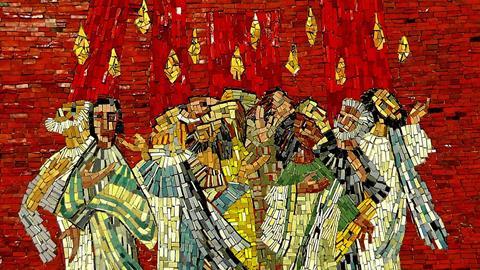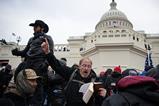Here’s why Pentecost is more relevant than ever says Ryan Diaz

Within the Church calendar, the season of Pentecost is often overshadowed by Advent, Christmas and Easter. But growing up in the charismatic tradition, Pentecost was mentioned frequently; the events of Pentecost shaped who we were. I learned from an early age that the Christian life is tangled up with the life of the Spirit. But for many, Pentecost is an historical event - a memorial to the Church’s birth - and nothing more. In one sense, this view is correct. Pentecost was a historical event; the Spirit broke through the veil of history and forever changed the course of human events. But when we relegate Pentecost to the past, we unintentionally relegate the power of the Spirit to the past as well.
While Pentecost has already taken place, in another sense, it is still taking place today. My charismatic upbringing taught me that the wind of the Spirit is still moving to and fro across the earth and that the same power that filled the upper room still empowers the people of God today.
Pentecost opens our eyes to the reality of the Spirit and reminds us of our present and future hope. When we take time to look back and remember what happened on that first Pentecost, we can better discern what the Spirit is doing today. Here’s three lessons from Pentecost:
1. Pentecost reminds us that life can be found in the presence of death
Pentecost began with “a sound like the rush of a violent wind.”(Acts 2:2, NRSV) In both Greek and Hebrew, wind and breath are interrelated terms. Readers, steeped in the Hebrew Scriptures, would have immediately recognised what was going on in Luke’s description of the events at Pentecost. God’s breath and Spirit, which hovered over the waters and animated Adam, was the same wind that was present in the upper room. By receiving the Spirit, Ezekiel’s vision is fulfilled, an army of dry bones is raised to life and a new humanity is born.
We can only begin our work in the world if the Spirit has first worked in us
Pentecost is a reminder that life can be found in the presence of death. For a year and a half, many of us around the globe have known nothing but death. We lost loved ones and watched as communities were torn apart by racial violence, Covid-19 and military conflict. Yet on Pentecost, we remember that the Holy Spirit is still active and at work in the world and that death is not final. The same Spirit that raised Jesus from the dead is the same Spirit at work in our communities and in us. The Holy Spirit sustains, empowers and revives our broken homes and souls so that even in the face of death, life might have the final say.
2. Pentecost reminds us that we’re bound together by blood and baptism
Language often serves as a point of division. Whenever we encounter someone who does not speak our language, we are cut off from them, unable to bridge the gap of understanding. While we can get by on gestures and assumptions, we exist across a chasm of unknowing without language to bridge the gap. At Pentecost, the Spirit bridged the gap of language and reconciled humans divided by geography and culture. At Pentecost, the curse of Babel is reversed, the old dividing lines are demolished and God’s promise to Abraham is fulfilled.
If new creation can’t be found in the body, we should’t expect to see its effects outside of it
When we celebrate Pentecost, we celebrate the birth of a new people, united across boundary lines and language. Pentecost reminds us that the old way of doing things is over. We no longer count people as other. Instead, we treat them as brothers and sisters. Our ethnic, economic and social divisions are sanctified by the Spirit. They are no longer boundary markers but entry points into a deeper understanding of those whose language we do not share. In an age where division has had a corrosive effect on the people of God, Pentecost reminds us that our bond is one of baptism and fire; partisan allegiances should no longer divide us.
3. Pentecost reminds us that there’s still work to be done
Peter’s first sermon is a direct result of the Spirit’s infilling. The Spirit works to revive us and unite us, but it also serves to empower us. The Christian life is entirely dependent on the power of the Holy Spirit. We can only witness to what we’ve experienced. This means that inward renewal is necessary for outward revival. Without the Holy Spirit, the Church is an empty shell “holding to the outward form of godliness but denying its power.” (2 Timothy 3:5, NRSV). If the Church is going to continue its work in the world, it needs to remember Pentecost. Our methodologies and theologies depend entirely on the Spirit’s animating, life-giving, soul-changing power. We can only begin our work in the world if the Spirit has first worked in us. If new creation cannot be found within the body, then we should not be surprised when we fail to see its effects outside of it.
This Pentecost, let us look back so that we may look in and let us look in so that we may look forward. The Spirit is still about his Pentecostal work, and in a post-pandemic world, we need the life-giving presence of God. The events of 2020 are not unique in human history. Pestilence, oppression and death are unfortunate realities of the human condition. In every age, the Church needs to face these giants afresh and recapture what it means to be filled with the Spirit. This Pentecost, let’s open ourselves up to the Spirit’s work and normalise what we so often neglect.





































